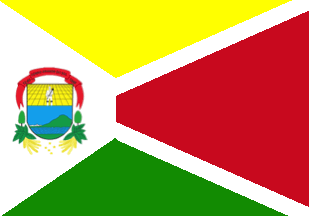
Last modified: 2020-07-14 by ian macdonald
Keywords: cerro grande do sul | rio grande do sul |
Links: FOTW homepage |
search |
disclaimer and copyright |
write us |
mirrors
 image by Ivan Sache,
14 July 2020
image by Ivan Sache,
14 July 2020The municipality of Cerro Grande do Sul (11,577 inhabitants in 2016; 32,476
ha)) is located 120 km south-west of Porto Alegre.
Cerro Grande do Sul
was established around 1910 as Colônia de Rio Grande, to be subsequently renamed
to Fortaleza. This name (Fortress) was coined after the vertical stone wall of a
neighboring hill that looked like a fortress. Since Fortaleza was already used
for other places, the town's name was changed to Cerro Grande, referring to
another, big hill ("cerro grande"). Of 500 m in elevation, this hill is the
highest point of the municipality and of Rio Grande do Sul' southern part.
The urban planning of Cerro Grande is credited to one of its earlier colonists,
Colonel Arthur Emílio Jenisch. Cerro Grande was elevated to the 3rd district of
Tapes on 13 May 1924. The municipality of Cerro Grande do Sul was established on
5 December 1988.
http://www.cerrograndedosul.rs.gov.br/
Municipal website
Ivan Sache, 14 July 2020
The flag and arms of Cerro do Sul are prescribed by Municipal Law No. 108
promulgated on 30 August 1990.
Article 2.
The coat of arms of the
municipality shall have the following design and description.
A Portuguese
shield, featuring: in the center a colonist carrying a hoe, on a square grid, on
a background or (golden), representing the colonists, their small plots dividing
the rural area, which is the main source of income for the municipality; in
base, vert (green), dexter, the hill ["cerro"] for which the municipality was
named, reaching in the same color the shield's base, divided by sinuous lines
azure (blue) and white, representing stream Velhaco, which is crossed by a ferry
to reach the district of Fortaleza, a name given to the place because of the
formation of the hill; sinister, below the hill, in the background, the seat of
the municipality surmounted in azure (blue), representing the sky over the
territory. In the outer part of the shield beneath the base is represented the
Southern Cross, which forms part of the name of Cerro Grande do Sul adopted at
political emancipation. The shield supported dexter and sinister by the main
agricultural resources of the municipality, plants of tobacco and rice and an
acacia. Beneath the shield a scroll (gules) inscribed "12/05 - CERRO GRANDE DO
SUL - 1988", the municipality's date of emancipation and naming."
Article
4.
The flag of the municipality shall have for official colors green, red,
yellow, and white. Green and yellow form a slanted-angled triangle, while red
and white form an isosceles trapezoid, representing:
I. Yellow: Soil
fecundity and economical progress resulting from political emancipation;
II.
Red: The people's manpower;
III. Green: Aspiration to prosperity and defense
of the ecosystem;
IV. White: Message of fraternity and peace.
Article
5.
The flag shall be featured according to the following rules and shapes:
I. The width shall be of 14 units.
II. The complement shall be of 20 units.
III. The green and yellow triangles are formed by a line that covers 20 units in
the flag's upper and lower borders; from the rectangle's four corners run
oblique lines that meet in unit 7 of the inner part and unit 5, in the
rectangle's length and width.
IV. The red trapezoid is formed by oblique
lines running from unit 1 of the rectangle's external part to the width of the
triangle's inner corners, distant of 1 unit from the line, forming two white
stripes, covering 2 units of the trapezoid's inner part.
V. The triangles and
trapezoid described above form another, white trapezoid in the flag's inner
part, charged in the center with the municipal coat of arms, 6 units in width.
https://leismunicipais.com.br/a/rs/c/cerro-grande-do-sul/lei-ordinaria/1990/11/108/lei-ordinaria-n-108-1990-institui-o-brasao-e-a-bandeira-como-simbolo-do-municipio-e-da-outras-providencias
Leis Municipais database
Photo
https://www.cerrograndedosul.rs.leg.br/camara/conteudo/publicacoes/Noticias/1/2018/28
Ivan Sache, 14 July 2020